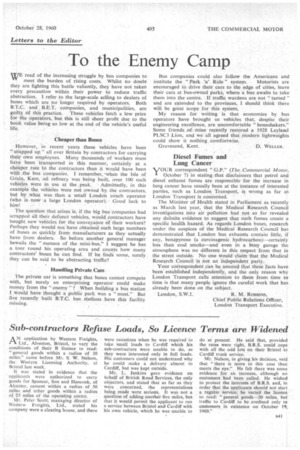Letters to the Editor
Page 75

If you've noticed an error in this article please click here to report it so we can fix it.
To the Enemy Camp
WE read of the increasing struggle by bus companies to meet the burden of rising costs. Whilst no doubt they are fighting this battle valiantly, they have not taken every precaution within their power to reduce traffic abstraction. I refer to the large-scale selling to dealers of buses which are no longer required by operators. Both B.T.C. and B.E.T. companies, and municipalities, are guilty of this practice. These vehicles fetch a low price for the operators, but this is still sheer profit due to the book value being so low at the end of the vehicle's useful life.
Cheaper than Buses
However, in recent years these vehicles have been "snapped up" all over Britain by contractors for carrying their own employees. Many thousands of workers must have been transported in this manner, certainly at a cheaper rate to the contractors than it would have been with the bus companies. I remember, when the Isle of Grain, Kent, oil refinery was being built, over 100 such vehicles were in use at the .peak. Admittedly, in this example the vehjcles were not owned by the contractors, but by what was .then a small London coach operator (who is a large London operator). Good luck to him!
The question that arises'is; if the big bus companies had scrapped all their defunct vehicles, would contractors have bought new vehicles for the Conveyance of their workers? Perhaps they Would not have obtained such large numbers of buses as quickly from manufacturers as they actually have from dealers. So before another general manager bewails the "menace of the mini-bus," I suggest he has a tour round his operating area and counts how many contractors' buses he can find. If he finds some, surely they can be said to be abstracting traffic?
Handling Private Cars
The private car is something that buses cannot compete with, but surely an enterprising operator could make money from the " enemy " ? When building a bus station I would have thought a public park was a "must." But five recently built B.T.C. bus stations have this facility missing. Bus companies could also follow the Americans and institute the "Park 'n' Ride " system. Motorists are encouraged to drive their cars to the edge of cities, leave their cars at hus-owned parks, where a bus awaits to take them into the centre. If traffic wardens are not " tamed " and are extended to the provinces, I should think there will be great Scope for this system.
My reason for writing is that economies by bus operators have brought us vehicles that, despite their engineering excellence, are uncomfortable " boneshakers." Some friends_ of mine recently restored a 1928 Leyland PLSC3 Lion, and we all agreed that modern lightweights could show it nothing comfortwise.
Gravesend, Kent. D. WELLER.
Diesel Fumes and Lung Cancer
YOUR correspondent " G.P." (The Commercial Motor, October 7) in stating that disclaimers that petrol and diesel exhaust fumes are responsible for the increase in lung cancer have usually been at the instance of interested parties, such as London Transport, is wrong as far as London Transport is concerned. • The Minister of Health stated in Parliament as recently as March last year, that the Medical Research Council investigations into air pollution had not so far revealed any definite evidence to suggest that such fumes create a specific health hazard. As regards London buses, research under the auspices of the Medical Research Council has demonstrated that London bus exhausts contain little, if any, benzpyrene (a carcinagenic hydrocarbon)—certainly less than coal smoke—and even in a busy garage the atmosphere was no different in this respect from that in the street outside-. No one Would claim that the Medical Research Council is not an independent party.
Your correspondent can be assured that these facts have been established independently, and the only reason why London Transport calls attention to them from time to time is that many people ignore the careful work that has already been done on the subject.
London, S.W.1. R. M. ROBBINS, Chief Public Relations Officer, London Transport Executive.




















































































































